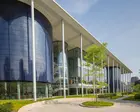
"Economic Development 101”: SOM Experts Provide an Inside Look at this Vast Field
Economic Development is a broad topic – from ensuring the economic growth of a city or nation to ensuring access to economic opportunities for those in poverty. To help unpack the wide array of possibilities that fall within economic development, the Yale School of Management Economic Development Club hosted a panel in which Professors Kate Cooney, Tony Sheldon, and Mushfiq Mobarak shared what “economic development” means to each of them, as well as the latest research and trends in the field.
What is Economic Development?
Kate Cooney kicked off the panel introducing the concept of economic development as,
“A process of creating and utilizing physical, human, financial, and social assets to generate improved and broadly shared economic well-being and quality of life for a community or region.” -Karl Seidman
She went on to explain how work in economic development is often intrinsically linked to economic growth, the increase in per capita income, and depends on a diverse ecosystem of interrelated factors and conditions. For example, an improvement to education may lead to a decrease in that region’s unemployment rate, or a change in city infrastructure may improve business retention. Some key areas of work include legal and regulatory policies, trade and tax policies, infrastructure and services, education, as well as job creation and business retention.
Economic Development in the US
Professor Cooney described how economic development in the US is in a period of change. Previously, the US was in a state of convergence, where less-developed regions were “catching up” to more well-developed regions. More recently, we’ve entered a period of divergence where the gap between poorer and wealthier areas is growing.
This change informs some of the latest trends in the field, such as the focus on inclusive growth: the desire to ensure gains from economic development are broadly shared without excluding any subset of the population. This focus has led to interesting research and policy questions surrounding zoning, gentrification, and racial integration in public education.
Other interesting trends in the field are focused on understanding the impact of technological change or geography on economic activity. Some examples of research in these areas involve analyzing the structure of the labor market, for example finding gaps between availability of and demand for jobs, as well as using data analytics to see the role neighborhoods can play in term of enabling or constraining economic development.
International Economic Development
Professors Tony Sheldon and Mushfiq Mobarak both spoke to their work in economic development worldwide. Professor Sheldon discussed his role teaching the Global Social Entrepreneurship class, where students work hand-in-hand with different organizations each semester on a variety of topics, from sustainable energy in India to impact investing in Brazil. He stressed that the key to creating true collaboration in these engagements was bringing an open mind and a strong sense of humility when advising and working with partner organizations.
Professor Mobarak, Founding Director of the Yale Y-RISE (Yale Research Initiative on Innovation and Scale), described that while there are many ways to achieve economic development, his work is focused on identifying the most effective and efficient approaches. He went on to share how SOM students were able to help on a recent research project of randomized controlled trials analyzing the impact of providing grid connections to electricity in Africa. Another focus of his research and his work with Y-RISE is focused on scalability. His projects with Y-RISE are centered around understanding the implications and additional challenges that may occur if we try to scale policies that have yielded positive economic development results locally to different regions or countries.
The panel offered a well-rounded perspective on what economic development means and how it can be interpreted across a range of contexts. More importantly, each professor offered students realistic guidance on how to put their business school learnings to good use and support economic development efforts both domestically and abroad.
By Nina Dhingra, MBA 2022
